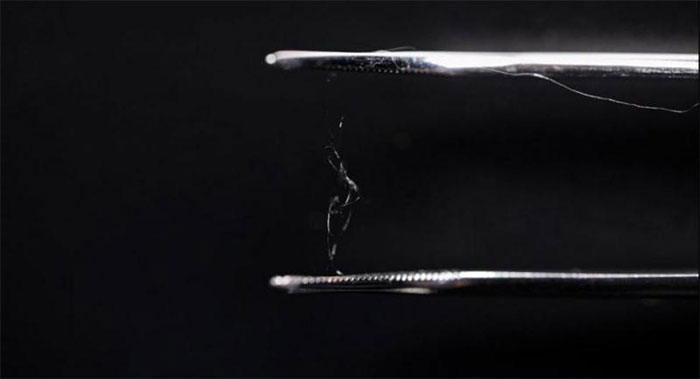Successfully manufactured biodegradable plastic materials
Scientists have created a new material combining silk and wood pulp that has similar properties to plastic, but is biodegradable and environmentally friendly.
By combining silk protein from cobwebs with wood cellulose , scientists have created a material with the same strength and elasticity as plastic.
Resilience is the standard so that a material can be stretched without being torn or broken, and so far, scientists have been looking for ways to create this combination for alternative biological products. plastic. To do that, they sought to combine the two biological components with the same goal. Cellulose is known for its strength, while spider silk fibers provide impressive resilience.
Pezhman Mohammadi, a researcher at VTT Technical Research Center of Finland, said: "We used birch tree powder, broke it down into cellulose nanofibers and organized them into a solid mass. At the same time, We infiltrated the cellulose network with a soft spider silk cohesion matrix. '

The scientists combined silk protein with wood cellulose to create a new composite material.(Photo: EEVA SUORLAHTI).
Mohammadi worked with scientists at Aalto University to produce this bio-based composite material. Although silk is produced by silkworms and spiders, scientists at Aalto University took silk sources from bacteria enhanced by synthetic DNA.
Markus Linder, a professor at Aalto University, said: "Because we know the structure of DNA, we can copy it and use it to produce silk protein molecules similar to those found in chemistry. in the webs ".
This process yields a material of high strength and stiffness, as well as increased toughness. Most importantly, this strength is not compromised when the material is stretched.
Science Advances described the new material as follows: 'The quality of the material is similar to that of plastic, but because it is biodegradable, the new material is more environmentally friendly.'
"Our job is to develop new and flexible possibilities of protein engineering. In the future, we may produce similar composites for construction," says Pezhman Mohammadi . We are currently working on new composite materials in the form of impact resistant objects and other products. "
- Creating bioplastics by marine algae
- Bioplastics - the technology of the future
- Self-biodegradable polymer materials
- Biodegradable plastics help reduce environmental pollution
- 'Liquid wood' will replace plastic
- Successful application of biodegradable polymers
- Super-durable plastic materials, self-destructible are made from shrimp shells and silk
- Biodegradable shoes
- Hanoi University of Technology successfully researched self-destructing plastic bags made from cassava flour
- Holland makes harmless plastics
- Young girl preparing plastic bag that decomposes in a few weeks from skin and fish scales
- Inventing new materials that contribute to
- Produce 100% organic biodegradable plastic bags, environmentally friendly
- Waste of biodegradable plastics produces greenhouse gases
 The US company is about to build a supersonic passenger plane of 6,000km / h
The US company is about to build a supersonic passenger plane of 6,000km / h Japan develops avatar robot as in fiction film
Japan develops avatar robot as in fiction film Australia tested the world's first mango picking robot
Australia tested the world's first mango picking robot America develops technology to separate water from animal waste
America develops technology to separate water from animal waste